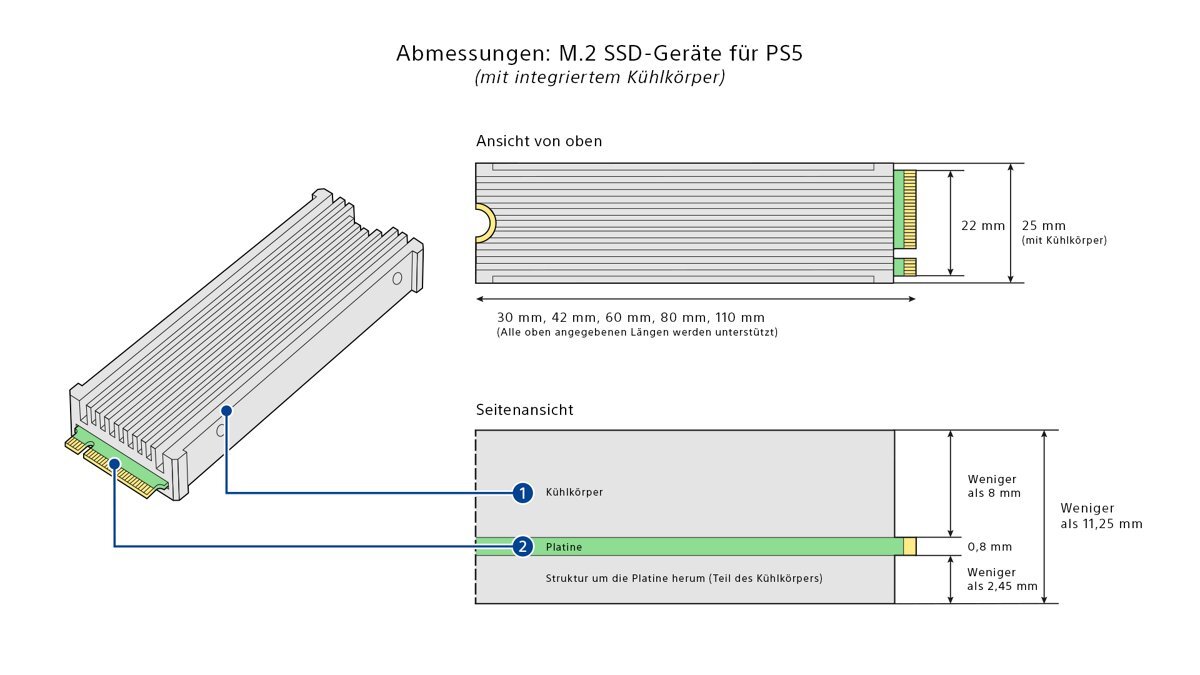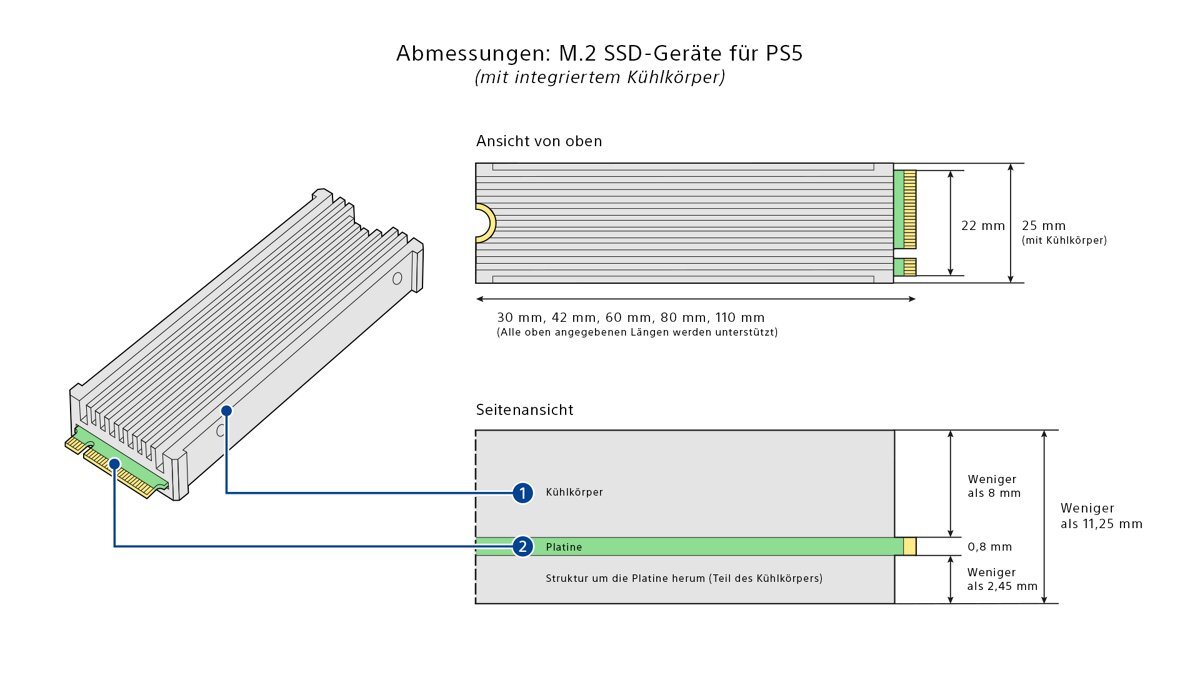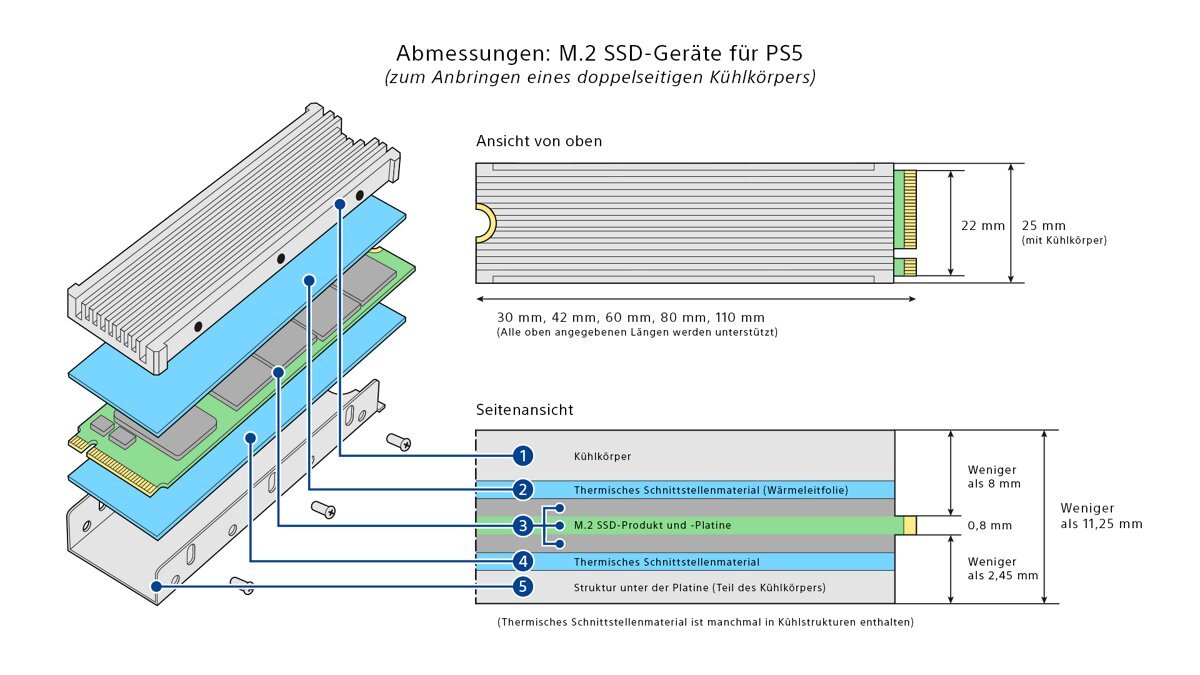Sony now states requirements for the M.2 SSDs, which can be used in the future to directly expand the internal storage space of the PlayStation 5. Initially, however, the option will only be introduced as part of the closed beta. The requirements may change until the official update.
PCIe 4.0 x4 must, 5.500 MB/s and more recommended
< p class = "p text-width">The provisional “Requirements for M.2 SSDs for PS5 consoles” limit the use to M.2 SSDs with PCIe 4.0 x4 as an interface. It was to be expected that slower SATA models would be left out, because the SSD should keep up with the speed of the PS5's own SSD as well as possible. Nevertheless, Sony does not give a general minimum requirement for the possible transfer rates and only gives the recommendation that the SSD should be able to read 5500 MB/s or more.
Most PCIe 4.0 SSDs of the first generation just fail at this brand, because the Guard equipped with Phison E16 controller achieves a maximum of 5,000 MB/s. The newer PCIe 4.0 SSDs of the upper class come in turn to 7,000 MB/s and more. Examples of this can be found below.
The NVMe Host Memory Buffer (HMB) function is also not supported by the PS5, according to the FAQ.
Standard formats up to 110 mm in length
The M.2 formats 2230, 2242, 2260, 2280 and 22110 are supported, with M.2-2280 being the most common form factor. The “22” stands for the width of 22 mm. The last digits stand for the length of the M.2 SSD. The connection must have the so-called M-Key, a precisely placed gap in the contacts, for PCIe-compatible M.2 SSDs. The B-Key stands for pure SATA SSDs, which are therefore also mechanically incompatible. Since only PCIe 4.0 SSDs are allowed anyway, the question of the connection type does not arise. The storage capacity can be 250 GB to 4 TB. It remains to be seen whether this is only a guideline based on the current models on the market or an actual limitation that excludes upcoming 8 TB models. So far, conventional M.2 SSDs with PCIe 4.0 are only available with up to 4 TB.
Flat coolers possible
The overall structure of the M.2 SSD including any cooler may be up to 25 mm wide and must be less than 11.25 mm high. M.2 SSDs with flat heat sinks are also an option. However, a further restriction must be taken into account that the height of the elements above and below the board must also match. Modules populated on both sides are supported, but the height above the board must be less than 8 mm and below the board less than 2.45 mm. To illustrate this, Sony has published the following auxiliary graphics.
-
 Limitations for M .2 SSDs with cooler (picture: Sony)
Limitations for M .2 SSDs with cooler (picture: Sony)
Image 1 of 3
 Limitations for M.2 SSDs with cooler
Limitations for M.2 SSDs with cooler  Limitations for M.2 SSDs with cooler
Limitations for M.2 SSDs with cooler Sony expressly points out that the specifications of the SSD should always be checked carefully by the manufacturer and, if in doubt, they should be asked about compatibility. It should also be noted that SSDs that exceed the recommended minimum of 5,500 MB/s cannot always load games as quickly as the internal “ultra-high-speed SSD” of the PlayStation 5.
Various SSDs are possible
M.2 PCIe SSDs with PCIe 4.0 x4 and at least 5,500 MB/s reading are now available from a number of different manufacturers. Seagate has seized the opportunity and at the market launch of the FireCuda 530 SSD in New Zealand confirmed its compatibility with the PS5, both in the normal version and in the version with heat sink. However, the Seagate manager's statement does not mention an official certification, as it is interpreted in some places. It would be desirable to have an official compatibility list for M.2 SSDs for the PS5.
Other models that, according to the manufacturers' key data, meet the requirements would be For example the Patriot Viper VP4300 (test), the PNY XLR8 CS3040 (variant without cooler), the Samsung 980 Pro (test) or the WD Black SN850 (test), which should also fit in the socket with cooler.
The Adata XPG Gammix S70 with a height of 15 mm would again be too high due to the cooler. The same applies to the Corsair MP600 Pro (test), which even comes to 23 mm. With a height of 11.4 mm, the Gigabyte Aorus Gen4 7000s fails very close to the height limit of 11.25 mm.
The editorial team thanks ComputerBase reader Jan W. for the hint.